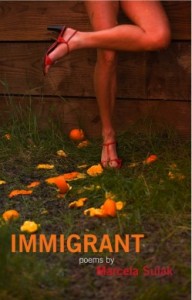by Marcela Sulak
First Books II, Summer 2011
THE HISTORY OF THE DATE
Those aren’t wrinkles, merely places where
the skin is burrowing to lick her own
dark sweetness. Since her body’s fashioned from
the clay remaining after Adams’ spine and hair,
she often yields the fibers of her trees
for baskets, shoes, the rope and needles, thread
her mythic children crafted in their need.
In her youth she tarried near the Euphrates;
Chaldean men en route through Babylon,
Assyrians, carressed and carried her
from one oasis to the next. A year
is worth a date palm, and a month, a frond,
according to the heiroglyphs that suckle
on her absence, spurting syllables.
 THE HISTORY OF BRUSSELS SPROUTS
THE HISTORY OF BRUSSELS SPROUTS
This vegetable evolved from primitive
non-heading Mediterranean kraut.
It wrapped its crinkly little leaves about
its winsome, blooming face and left to live
a classic Bildungsroman. Adjusting mein
and flavor, traveling north and west, it came
upon the gates of Brussels, took the name
that welcomed it. Gentlemen and lean
courtesans took into their mouths its tight
green jackets, endlessly disrobing, sheets
of luminosity pressed close. And fleets
dispatched to newer worlds carried wide
and far its seed. Like any immigrant,
it put down roots before it could repent.
THE HISTORY OF THE RADISH
In its wild state it’s utterly unknown,
but it may come from China or Japan
and may descend from Raphanus Raphan-
istrum. In days of Pharaohs, it was grown
extensively in Egypt. How its name,
from Saxon, rude, rudo, or reod,
or from the Sanskrit rudhira, for blood,
was hid from Britain till Gerard would claim
in 1597, four distinct
varieties. From cellophane, denude
of greeny tops, or peasant fingers, rude
and cakey earth, we lift them to the sink,
recalling how Egyptian women dyed
their nipples scarlet in a braver night.
THE HISTORY OF THE WATERMELON
Imagine a desert, with real sand, with cracked stones
the color of furnaces, ash-rimmed and glowing
with heatnot an analogy for your own
barrennessthis is a desert. The black granite groans
in the fissures of daybreak, your dry thirsty tongue
stumbles upon a band of nomadic syllables. Here are
the dust-covered hoof prints of livestock, the lizards
that thrive in the shadows, the wind driving forward, the sun. It
is tomorrow or last year or eight thousand years
ago. Time doesn’t matter, before you, a tawny
vine languidly stretches as if it were yawning,
the wind parts her leaves, then one hundred melons appear
warm to the touch. Broken open, the pale wet mouths spill
their sweet water, crisp waternow drink your fill.
Black Lawrence Press is an independent press specializing in books of contemporary literature and creative nonfiction; they are an imprint of Dzanc Books. Reprinted by permission.
Marcela Sulak is the author of Immigrant (Black Lawrence Press, 2010) and the chapbook Of all the things that don't exist, I love you best (Finishing Line Press, 2008). She's translated three books of poetry from the Czech and the French (Congo-Zaire). In April 2010 she left Washington DC for Tel Aviv, where she directs the Shaindy Rudoff Graduate Program in Creative Writing at Bar-Ilan University. To read more by this author: Marcela Sulak: Museum Issue